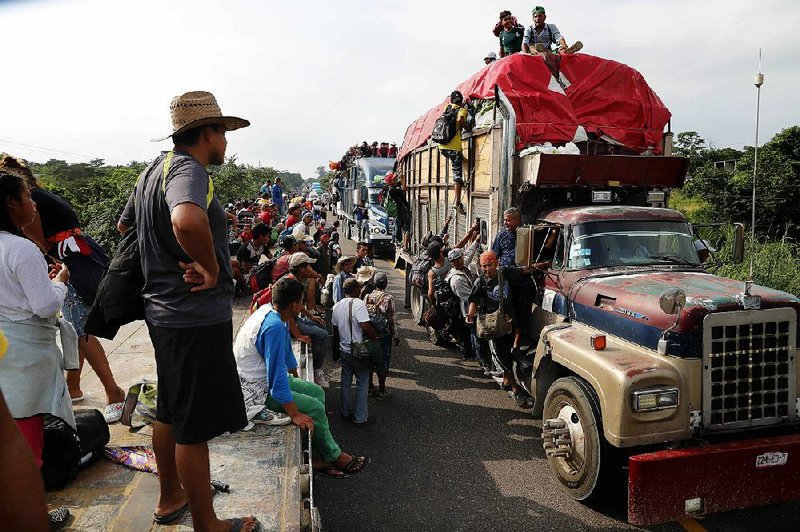Six Honduran migrants and their children sued President Donald Trump's administration over the president's plan to use troops to stop a caravan from entering the U.S., claiming the policy of denying Central Americans their lawful right to seek asylum is unconstitutional. They seek to represent all Mexican, Central American and South American migrants looking for asylum in the U.S.
If successful, the people in the caravan of thousands of migrants would be entitled to a hearing in the U.S. to determine whether their asylum claims are valid. Trump has vowed not to allow any of the migrants into the U.S. and says he'll send as many as 15,000 troops to the border to stop them.
Trump vows to house migrants in tent cities on the U.S.-Mexico border -- a move that likely violates an agreement on detaining migrant children, according to the complaint.
The president has also said he will change rules so as to deny asylum to those who enter illegally.
"The legal problem with Trump's plan to stop caravan persons from entering this country is that plaintiffs are seeking asylum, and Trump simply cannot stop them from legally doing so by using military, or anyone," attorneys for the migrants said in the complaint.
Meanwhile, after three weeks walking along highways and hitching rides, thousands of Central American migrants traveling in a caravan through southern Mexico learned Friday that they would soon be leapfrogging ahead to Mexico's capital in buses.
As the caravan crossed into the Gulf Coast state of Veracruz, Gov. Miguel Angel Yunes announced that authorities there would be providing not only humanitarian assistance but also offering mass transportation for the migrants.
"It is very important that they be able to move soon from Veracruz toward another place," Yunes said in a video message released in the evening. "For that reason we also offered them transportation so that, if possible, tomorrow ... they may be able to go to Mexico City or to the place they wish."
During an evening assembly, caravan organizers told the migrants that they would be leaving around 5 a.m. for the capital in about 150 buses.
The announcement came after the migrants' request for buses to Mexico City were ignored by the Mexican government days earlier when they were in Juchitan, Oaxaca state.
Earlier Friday, a third caravan of migrants -- this one from El Salvador -- waded over the Suchiate River into Mexico, bringing another 1,000 to 1,500 people who want to reach the U.S. border.
The third caravan had tried to cross the bridge between Guatemala and Mexico, but Mexican authorities told those traveling in it they would have to show passports and visas and enter in groups of 50 for processing.
The Salvadorans expressed misgivings that they would be deported, so they turned around and waded across a shallow stretch of the river to enter Mexico. Although police were present, they did not try to physically stop the migrants.
Mexico is now faced with the unprecedented situation of having three caravans stretched out over 300 miles of highways in the southern states of Chiapas and Oaxaca, with a total of about 6,000 migrants. The first, largest group of mainly Honduran migrants entered Mexico on Oct. 19.
Though the first caravan once numbered as many as 7,000, it has shrunk significantly. Mexico's Interior Department estimated that, as of Friday, it numbered only 3,000 people.
The second caravan, also of about 1,000 to 1,500 people, entered Mexico earlier this week and is now in Mapastepec, Chiapas. In addition, the government identified a fourth, smaller group of 300 Central American migrants walking farther ahead, in Veracruz.
Information for this article was contributed by Andrew Harris of Bloomberg News; and by Sonia Perez D. and Peter Orsi of The Associated Press.
RELATED ARTICLE
https://www.arkansa…">Doubt raised on troops' border mission
A Section on 11/03/2018

